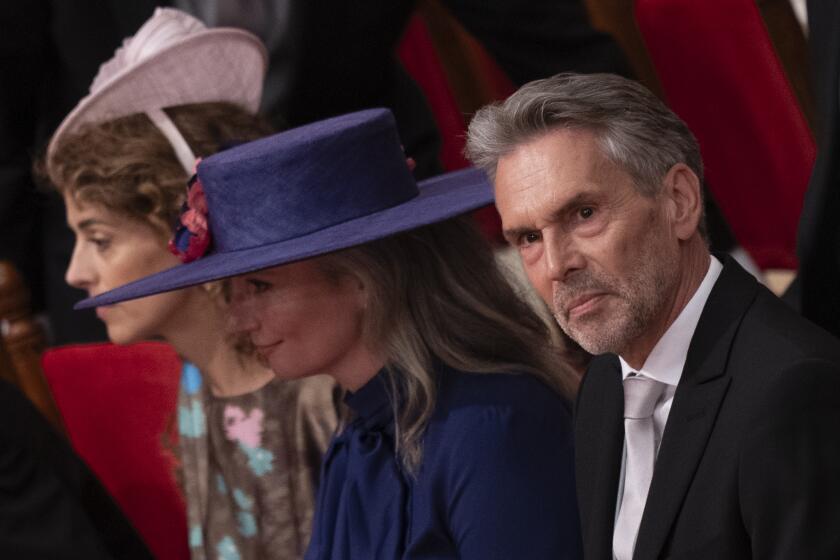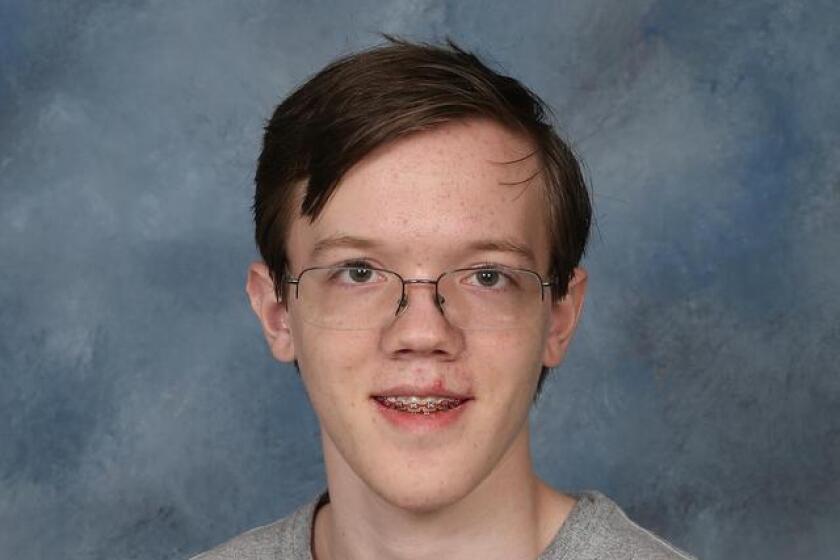In the Panhandle, hard times and high hopes for the GOP
At Adams Pawn, a middle-aged man in a tracksuit haggles with the shop’s proprietor over a Winchester rifle.
Shop owner Charles Harding shakes so violently from Parkinson’s disease that he clutches the counter for support. But he gives the customer his best sales pitch. A $250 transaction like this could be the difference between a good day and a bad.
The pawnshop is a much-frequented establishment and an economic bellwether in this hard-up corner of the Panhandle, home to military bases, evangelical churches and conservative Republican voters.
Before the last general election, Democratic strategists defined people like Harding -- politically disaffected, blue-collar voters -- as a key demographic to win in 2004. But as they have done every election without fail since John F. Kennedy’s run in 1960, people here went for the Republican candidate, with 65% of Escambia County residents voting for George W. Bush.
The winner of the Republican primary in Florida on Tuesday will take all of the state’s delegates, making it a key battleground for the GOP contenders. Former Arkansas Gov. Mike Huckabee has won Harding’s vote.
“I like the way he sounds,” he says, standing in the crammed pawnshop across the street from Dinosaur Adventure Land, a “Bible-based creation museum,” according to the sign out front.
Harding, 64, saw Huckabee on Jay Leno’s show and the candidate left a favorable impression. He seems to be “one of us” instead of “one of them,” he says, referring to the economic and political elite of New York and Washington.
Although his top concern is the economy, Harding has a visceral election-year caveat known among some Republicans as ABC, or Anybody But Clinton.
“We had eight years of the Clintons. We don’t want another eight,” he says, before his wife, Rhoda, interjects: “We don’t want another eight years of Bush either. And I say that even though I voted for him.”
Rhoda is 61, but her freckled cheeks and strawberry-blond hair makes her look younger. She is also drawn to Huckabee. She’s a bit shaky on his economic policy, but finds his outside-the-Beltway personality attractive. “He sounds down to earth,” she says.
Charles’ daughter, Linda Anderson, 44, is visiting from Coral Springs, a city in southern Florida where Rudolph W. Giuliani is more popular. Like her neighbors, Anderson supports the former New York mayor who, she says, showed his mettle on Sept. 11.
Charles’ sister, Margaret Chandonnais, 58, is visiting from New Hampshire. She supports Sen. John McCain of Arizona because of his history and experience.
The split in the family reflects the Republican division in Florida.
“There’s not one particular candidate who embodies everything you’d want in a conservative,” says Clay Ingram, chairman of the Escambia Republican Party, who is leaning toward former Massachusetts Gov. Mitt Romney.
In northwestern Florida, voters fall into two distinct groups, Ingram says: people affiliated with the military who vote according to pragmatic concerns, and evangelical Christians whose votes are determined in large part by the candidate’s views on abortion and other social issues.
The Hardings, who both voted for Bush in 2000 and 2004, say they are disgusted by the costly open-ended war in Iraq and by the government’s failure to help their coastal community rebound after hurricanes.
By almost every indicator, the quality of life for people like the Hardings has worsened since 2004. Crime and unemployment are rising while property values are dropping, government statistics show.
Although there was a building boom after Hurricane Ivan in 2004, the housing market is now strained because of insurance hikes and a weakened tourism industry.
Almost 20% of all earnings in Pensacola are tied to relatively stable defense spending, but the economy has weakened substantially in recent years, said Rick Harper, director of the Haas Center for Business Research and Economic Development at the University of West Florida.
“The post-hurricane spending hangover has set in,” he said. “The northwestern metropolitan area is in a recession.”
Abstract talk of a national recession is concrete reality at the Hardings’ pawnshop, where 4 out of 5 customers used to reclaim their belongings after payday. Today, only 2 in 5 return.
Their belongings are surrendered according to an unspoken hierarchy. First the fun goes -- guitars, golf clubs, scuba gear. Then more essential items -- vacuum cleaners, garden tools. When that is gone, people pawn things that mean the most -- the watch, the necklace, the wedding band.
When the Hardings voted for Bush, they trusted the war would end once U.S. troops uncovered weapons of mass destruction in Iraq. They were hopeful their wrecked world would return to normal once the insurance company paid to repair the roof blown off by the storm.
Though the couple believe in minimal government, they expected there would be emergency help -- perhaps a loan to cover the hurricane damage. Their insurance company paid only half the cost of repairing the roof, and federal officials turned them down when they applied for assistance. They never returned to an even keel.
The Hardings, who earn about $2,000 a month, could no longer afford health insurance. When their son Ronnie started suffering from bouts of fatigue, he refused to get tested because it would strain family finances, and his leukemia went undetected.
Ronnie died July 28. He was 43.
The week Ronnie spent in a hospital cost almost $100,000, and the Hardings are already $50,000 in debt. All they got from the government was $250 in assistance for their son’s cremation. “That’s what you’re worth here in America,” Rhoda says.
After two decades of running Adams Pawn, they are trying to sell their business. But in this depressed economy, there are no buyers.
Rhoda doesn’t want to complain, she says. From behind the counter, she sees how others struggle: the young construction worker pawning his tools; the pensioner pawning her dead husband’s wedding band and claiming it as soon as she receives her Social Security check, then doing it all over again next month.
For more than 40 years, the couple paid their taxes. But now when they need help, there’s nowhere to go, they said.
Rhoda says Huckabee’s modest upbringing will make him sympathetic to people like her and her husband.
“He sounds like he wants to help people,” she says.
This is what government is about, she says, helping people when they can no longer help themselves.
“I wish I could talk to the politicians,” she says. “I’d tell them: ‘We’re human too. We’re not trash.’ ”
--
More to Read
Sign up for Essential California
The most important California stories and recommendations in your inbox every morning.
You may occasionally receive promotional content from the Los Angeles Times.










